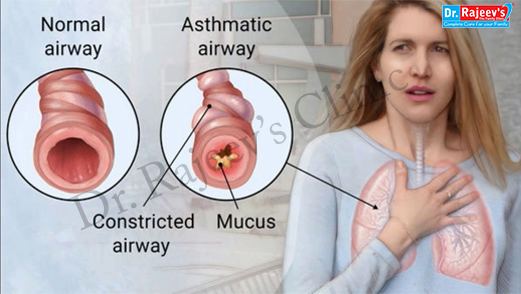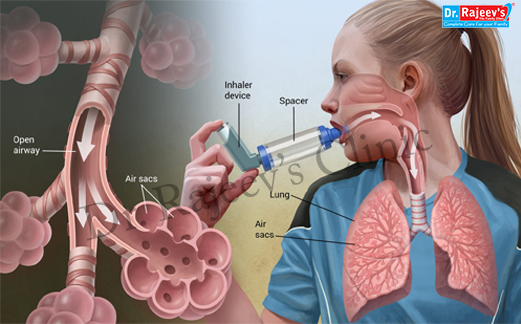

Asthma is a chronic inflammation of the bronchial tubes (airways) that causes swelling and narrowing (constriction) of the airways. The result is difficulty breathing. The bronchial narrowing is usually either totally or at least partially reversible with treatments.

Asthma symptoms vary from person to person.They may have infrequent asthma attacks, have symptoms only at certain times — such as when exercising — or have symptoms all the time.
Asthma signs and symptoms include:
Signs that Asthma is probably worsening include :
For some people, asthma signs and symptoms flare up in certain situations:
Actual cause of Asthma is unknown but it's probably due to a combination of environmental and inherited (genetic) factors.
Exposure to various irritants and substances that trigger allergies (allergens) can trigger signs and symptoms of asthma. Asthma triggers are different from person to person and can include:
A number of factors are thought to increase the chances of developing asthma. They include:
Asthma complications include:
Proper treatment makes a big difference in preventing both short-term and long-term complications caused by asthma.

Prolonged attacks of asthma that do not respond to treatment with bronchodilators are a medical emergency. Physicians call these severe attacks "status asthmaticus," and they require immediate emergency care.
The symptoms of severe asthma are persistent coughing and the inability to speak full sentences or walk without shortness of breath.Chest may feel closed, and our lips may have a bluish tint.Also there is feeling of agitation, confusion, or an inability to concentrate.These are signs of an impending respiratory system failure.
Pulmonary function test
Arsenic Album -: Most useful medicine for suffocative cough, wheezing, and shortness of breath. Given in that cases of Asthma that gets worse around midnight.Most recommended when asthma alternates with skin rash or eczema.
Spongia Tosta -: Useful for asthma with a dry cough which is deep, barking, hacking type. There is extreme dryness of all the air passages.Helpful when dry cough is associated with whistling sound from the chest on inspiration.Given when warm drinks bring relief from the cough.
Antimonium Tartaricum –: Excellent remedy for asthma with an excessive, rattling cough.Useful for loose, rattling cough with feeling of full of mucus in lung.There is Mucus from the lungs is raised with much difficulty. Useful rapid and difficult respiration.There is excessive suffocation is which worsens on lying down, with a need to sit up.
Ipecac : Useful when there is excessive cough with mucus rales in the chest.Most helpful when the cough is accompanied by suffocation, shortness of breath and gasping for air.Recommended when child may become blue and stiff during the asthma attack.
Sambucus Nigra -: Very useful medicine for night asthma episodes in children. Given when child wakes up suddenly at night, with cough and suffocation.
Blatta Orientalis and Bromium -: Given when asthma get triggered by exposure to dust. Useful for a cough with difficult respiration and pus-like mucus.
Bromium -: Useful when there is cough with the rattling of mucus.There is suffocation and difficulty in breathing after exposure to dust.
Lobelia Inflata -: Very useful medicine for vasthma for smokers.There is difficult,short respiration with cough.There is oppressed feeling in the chest with lump sensation in throat.Also useful for burning in throat.
RL19